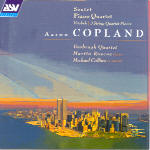In the 20th century, chamber works often have been the domain of a composer’s more personal or private musical expression wherein unfamiliar motifs can freely join with tonal experiments that can’t or won’t fit well into a broader-canvassed work. This is true of Bartók and Shostakovich; it is certainly true of Aaron Copland. In Copland’s case, however, more weaknesses than strengths appear in his chamber music, and in the hands of a less-adept ensemble, as we have here, these weaknesses can become glaring. They’re all too evident in the Movement for String Quartet where the young composer struggles with sustaining clear Bergian motifs even as his penchant for melodiousness wants to emerge. Two Pieces for String Quartet (1928) hints of the more expansive Romantic to come, but the roughness of the playing occasionally pushes the work’s indigenous lyricism into an unpleasant shrillness. The Quartet for Piano and Strings (1950) is the only mature work on this disc, but the Vanbrugh Quartet has trouble at several important junctures and the conflicting notes simply jar (especially in the first movement, about half-way through). Worse, the overall sonics are biased toward the high end (always risky when you only have strings). Sonic failings aside, ultimately you can’t get away from the overall impression that the Vanbrugh Quartet is simply not well enough in control, not familiar enough with the music, and even Copland at his weakest deserves better.
































